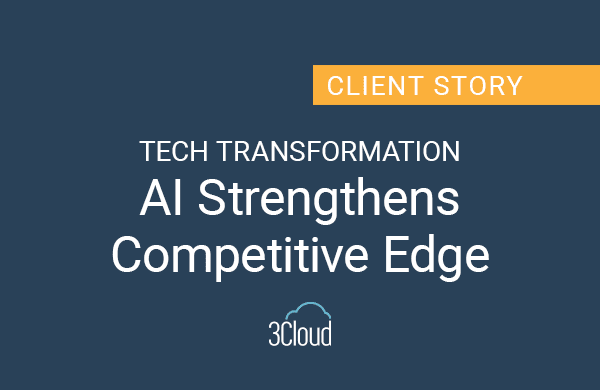Today, the need for efficiency, productivity, and seamless collaboration has become very important. Enterprise applications, commonly known as enterprise apps, have emerged as a critical solution to streamline business operations and enhance overall organizational performance. These applications encompass a wide range of software solutions designed to address various aspects of a business, from customer relationship management to supply chain optimization. In this article, we will discuss the pivotal role of enterprise apps in achieving operational efficiency, exploring their benefits, cloud solutions, common use cases, considerations for choosing the right app, 3Cloud success stories, and more. But first, what are they?
What are Enterprise Apps?
Enterprise apps refer to software applications specifically designed to cater to the needs of businesses and organizations. These apps go beyond simple consumer-oriented applications and are tailored to address complex business processes and workflows. They are characterized by their scalability, integration capabilities, and ability to facilitate collaboration among teams. 3Cloud’s expert app developers ensure your apps are adaptable to work the way you do.
Importance of Streamlining Business Operations
Streamlining business operations is a fundamental goal for organizations of all sizes. Efficient operations result in reduced costs, optimized resource utilization, faster decision making, and improved customer satisfaction. Traditional manual processes can lead to bottlenecks, errors, and delays, hindering your company’s ability to compete effectively in the market. See it in action: A large dental insurance provider needed modernized systems to remain competitive and to boost customer satisfaction.
The Role of Enterprise Apps
Enterprise apps are like the MVPs of operational efficiency: they automate manual processes, streamline workflows, and foster improved collaboration and communication. Let’s breakdown the benefits they offer in greater detail.
Benefits of Enterprise Apps
Enhanced Productivity and Efficiency: Enterprise apps automate routine tasks, reducing the need for manual intervention. This allows employees to focus on high-value tasks, boosting overall productivity and efficiency.
- Automation of Manual Processes: Manual processes are prone to errors and inconsistencies. Enterprise apps automate these processes, reducing human errors and ensuring accuracy. See how to put people first in application modernization.
- Streamlined Workflows and Task Management: Enterprise apps provide tools to map out and optimize workflows, ensuring tasks are routed efficiently and completed in a timely manner.
- Improved Collaboration and Communication: Real-time collaboration features within enterprise apps break down communication barriers and allow teams to work together seamlessly, regardless of their location.
- Real-time Collaboration Features: Real-time messaging, file sharing, and collaborative editing enable teams to work together as if they were in the same room, even when they are geographically dispersed.
- Centralized Data and Information Sharing: Enterprise apps centralize data and information, eliminating silos and providing a single source of truth for all stakeholders.
- Scalability and Flexibility: Enterprise apps are designed to grow with the organization. As the business expands, these apps can scale to accommodate the increasing workload and demand.
- Adapting to Changing Business Needs: Business environments are dynamic, requiring constant adaptation. Enterprise apps can be customized and configured to meet evolving specific business requirements.
- Accommodating Growth and Expansion: Whether your company is opening new branches or expanding globally, enterprise apps can support growth by providing consistent processes and tools across locations. As your company is growing, don’t forget to read our 5 hidden costs of offshore and nearshore development.
Leveraging Cloud Solutions for Enterprise Apps
Cloud solutions have revolutionized the way businesses operate by offering scalable, cost-effective, and accessible platforms for deploying enterprise apps. Microsoft Azure has gained traction for its extensive range of services and capabilities. Two key advantages of cloud-based Enterprise Apps are cost efficiency and seamless interoperability.
Cloud-based enterprise apps eliminate the need for extensive on-premises infrastructure, reducing upfront costs and ongoing maintenance expenses.
- High Availability and Reliability: Cloud platforms like Microsoft Azure offer high availability and redundancy, minimizing downtime and ensuring continuous access to critical applications.
- Integration with Existing Systems and Technologies: Cloud-based enterprise apps can seamlessly integrate with existing software systems and technologies, preserving previous investments and enhancing overall efficiency.
- Seamless Data Exchange and Interoperability: Cloud solutions facilitate smooth data exchange between different applications, departments, and even external partners, ensuring interoperability.
- Compatibility with Legacy Systems: Cloud platforms support integration with legacy systems, allowing organizations to modernize their operations without disrupting existing workflows.
MultiCare Health System recognized the need for flexibility in its data systems so that it could provide the best care for its patients.
Common Use Cases of Enterprise Apps
Enterprise apps find application in various domains across industries. Some common use cases include:
- Customer Relationship Management (CRM) Apps: CRM apps help businesses manage customer interactions, track leads, and enhance customer satisfaction through personalized communication.
- Human Resources (HR) and Talent Management Apps: HR apps automate recruitment, onboarding, performance management, and employee engagement processes, improving workforce management.
- Supply Chain and Inventory Management Apps: These apps optimize supply chain processes, ensuring efficient inventory management, order processing, and demand forecasting.
- Project Management and Collaboration Apps: Project management apps facilitate project planning, task assignment, progress tracking, and team collaboration, enhancing project delivery.
Considerations for Choosing Enterprise Apps
When choosing enterprise apps, a range of critical factors should be taken into consideration. The capacity for customization and flexibility is pivotal to tailor apps to harmonize with an organization’s distinct workflows and processes. Robust security measures, which serve to fortify the protection of sensitive business data and uphold regulatory compliance need to be taken into account. Speaking of which, adherence to industry-specific regulatory requirements, particularly concerning data privacy regulations, is crucial. Plus, the availability of comprehensive support and maintenance services guarantee the seamless functionality of enterprise apps. READDI, a research organization associated with UNC-Chapel Hill, needed to replace their legacy software solution for project management and reporting. See how we helped propel them into the future on Azure.
Challenges and Mitigation Strategies
Implementing enterprise apps can be challenging with resistance to change, integration complexities, and inadequate training. Proper change management strategies and comprehensive employee training programs are vital to ensure successful adoption and integration. When implementing enterprise apps, it’s important to consider the following strategies:
- Planning: Determine what results you want from the implementation and how you can introduce it to your colleagues.
- Transparency: Transparency is important when changes occur since it allows everyone to have the information they need for success. Implementing with a focus on transparency can further enhance the effectiveness of these changes.
- Communication: Explaining the change process well ensures everyone understands their involvement and how they can make the changes more effective.
- Involvement: It’s important to consider who a change involves so you can include them in deciding how it occurs and the outcomes it achieves. Not sure who should be involved? Conducting a stakeholder analysis can help pinpoint key individuals and maximize the impact and success of the change.
Future Trends in Enterprise Apps
The future of enterprise apps holds several exciting trends. Anticipate remarkable strides in Artificial Intelligence and Machine Learning and the convergence with Internet of Things (IoT) devices is on the horizon, thereby elevating the quality of decision-making and operational efficiency. Not to mention, a heightened emphasis on data analytics and business intelligence is in store for enterprise apps, providing organizations with the tools to formulate well-informed decisions grounded in real-time, actionable insights.
Enterprise apps have become indispensable tools for businesses aiming to streamline their operations, enhance collaboration, and achieve greater efficiency. Through automation, centralized data management, scalability, and integration capabilities, these apps empower organizations to prepare for changing business needs and thrive in today’s market. As technology continues to evolve, the role of enterprise apps is set to expand, driving innovation and transformation across industries.
Learn more about building your next stage of growth with purpose-built Enterprise Apps on Azure. Operationalize the cloud and discover the ultimate Azure experience.




